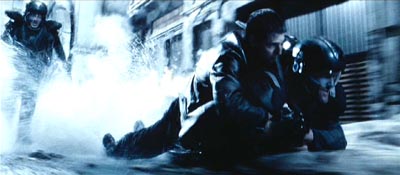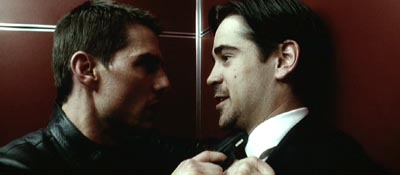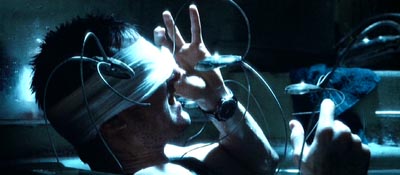Minority Report
Spielberg comes over all gritty and noir in a stylish future-thriller...

Fresh from the unsatisfying joint venture that was A.I., Spielberg returns to mainstream commercial form with Minority Report, his slickest effort for some time. Based on the Philip K. Dick short story of the same name, Minority Report stars Tom Cruise as John Anderton, head of Washington's Precrime Unit which endeavours to capture murderers before they actually commit the act. They achieve this through use of 'precognitives'; humans with psychic potential who are kept constantly vegetative at the Precrime headquarters where they pass on visions of future murders to Anderton and his team.
The film opens with a demonstration of this technique where we see the Cruiser sifting through visions as graphics on a display screen, manipulating them with sensor-implanted gloves as a conductor would instruct his orchestra. It's a virtuoso example of Spielberg's vision at it's best, and there are many more throughout the film. Having identified the suspect, Anderton and his squad swoop on the premises and catch him just as he is about to commit the ultimate deed. Another murder prevented, another victory for the Precrime Unit, especially Cruise's character whose son, we later learn, was murdered six years previously.
Only one man seems unhappy with all this. Colin Farrell plays Danny Witwer, sent in to investigate the Precrime Unit before the government rolls the program out to the rest of the United States. Witwer is concerned about the ethics of the system, and herein lies the movie's Big Moral Message; until the crime is committed, how can we know the precognitive visions are correct, and therefore how can someone be judged on actions they have yet to perform? It's a theme the likes of which Dick aficionados will be completely familiar with; as technology advances, at which point does it begin to cross ethical boundaries, and where do we draw the line? We know a murder will be committed, but until someone dies, is it correct to act upon that knowledge? There's a philosophical minefield there within which the film could easily have been bogged down, especially had it followed the original text more closely. Somewhat wisely, Scott Frank and Jon Cohen's script focuses less on the debate than on the imminent action, and that's a very good thing indeed...
No sooner is everyone getting a tad pissed off at Witwer's probing intervention than the unthinkable happens; the precognitives point the finger of justice at one of Precrime's own. As the alert sounds indicating details of a new pre-murder, Cruise rushes to his console to recognise his own face as that of the killer-to-be, and his utopian vision comes crashing down around him. What follows is a template of relatively standard chase-movie nature, only infused with clarity, vision, intelligence and inventiveness.

The next hour or so of the movie resembles a futuristic version of The Fugitive as Cruise searches for his would-be victim Leo Crow with the help of a kidnapped precognitive called Agatha (Samantha Morton, widely acclaimed for her performance, somewhat strangely since all it involves is drooling a lot and looking scared the whole time). Agatha, it seems, holds the key to this and other potentially false arrests where there seems to have been a 'minority report' that has been mysteriously deleted. These reports occur where one of the precognitives returns contradictory information to the others, and would otherwise halt the whole arrest process were it not for their destruction by some unknown party.
As the chase gets underway the viewer is treated to a futuristic spectacle rendered impressively by the talents of Spielberg's effects and technical crews. It's a vision of the future somewhere between Blade Runner and The Fifth Element which manages to be somehow familiar yet not particularly derivative. My only niggle is that here Spielberg seems to have jumped on the bleach-bypass filter bandwagon, giving these sections of the film a steely blue-hued look similar to many other recent 'stylish' films dealing with a futuristic or noir subject matter. Fortunately the interior sections are an improvement, with some exceptional set design and decoration. One section in particular stands out where a number of robotic 'spiders' are sent into an apartment block to sniff out Anderton, not only showcasing the set, but also a fine piece of one-shot aerial photography from Janusz Kaminski and his camera team.
The big set-pieces of the film literally take off with Cruise escaping onto the roof of his futuristic motor as it travels along the city's automated highways which, brilliantly, include roads travelling down the sides of buildings. There follows a jetpack chase through the back streets and apartment blocks of D.C. that shows both a keen sense of action timing and not a little Spielberg humour (witness an out of control jetpack setting light to some hamburgers on a grill, and the superb incapacity-inducing 'sick sticks' carried by the cops). The action moves onto a car factory as Witwer catches up with his quarry, and lots of inexplicably placed plastic barrels full of water (a futuristic replacement for empty wooden crates) get photogenically knocked about as a fight involving concussion guns ensues, knocking people off their feet left right and centre.

Anderton eventually catches up with Lamar Burgess, his senior and mentor (played with the kind of concealed menace you can't quite put you finger on by a wonderful Max von Sydow), and Dr. Iris Hineman (Lois Smith), creator of Precrime but now retired since disowning her work, both of whom he hopes can help him avoid his seemingly inescapable destiny. Ultimately he meets his intended victim Crow, who, it transpires, would appear to be the man responsible for the loss of his son. Or is he?
Minority Report succeeds on both levels; action/chase flick and thinking man's future noir. That it does so is testimony to the talents of many, but in particular a superb cast. Cruise has lost his Mr. Charming grin and all pretense of his current Hollywood status to deliver a believable performance as a man wounded by loss both in work and at home. Farrell shows once again as in Hart's War amongst others that he is the Next Big Thing amongst the heavyweight leading men, showing depth and bringing no small amount of charm to a role that could easily have been portrayed as cliched hard-ass. Samantha Morton, as mentioned earlier, fills her role well within it's obvious boundaries, and the many supporting players such as Peter Stormare (a deranged eye doctor who performs a back-alley goggle transplant for the Cruiser) and von Sydow all carry their roles with the necessary class and conviction so that even casual viewers who don't find sci-fi their bag can relax and enjoy the ride.
Something is afoot in the Spielberg camp lately. His days of boyish action and overt family-oriented sentimentality may well be over. A scene in which Cruise eats from a cereal packet upon whose side advertising animation loops endlessly would probably have been played for laughs ten years ago. Here it seems sinister. Everything about the environments in Minority Report imply the borderline of a waking nightmare; real in a way we can relate to, but distant enough to make us feel alien. Perhaps collaborating with the late Stanley Kubrik has taught Spielberg that life isn't all roses and happy endings, and here it feels as if something of the Master's foreboding has rubbed off on the Prodigy.
I wasn't sure how to take Minority Report at the cinema, and I think this is largely due to the fact I'm a big fan of Philip K. Dick and found it hard to separate the film from the source material. Having watched it again on DVD, however, I grow more impressed on each viewing, and I'm almost convinced this is the finest bit of future noir since Blade Runner. It doesn't quite drip the atmosphere of that particular film (which again, interestingly, was based on a Dick story), but Minority Report successfully marries mass-market entertainment elements with a serious probe into the future of technology in our society like few other films before.
The only reason this doesn't earn five stars is because Spielberg fails to cope with the loose ends in the final 40 minutes as well as he has the rest of the film. This and other minor niggles aside though, I would highly recommend you file Minority Report under 'Immediate Viewing'. You won't be disappointed.
The King Of The Disko has pointed his bejewelled finger in the direction of this movie and bellowed "You, Sir, may be awarded 4 out of 5 Arbitrary Disko Units!". Let no mere mortal argue otherwise.
Colin Farrell (Danny Witwer)
Samantha Morton (Agatha)
Max von Sydow (Lamar Burgess)